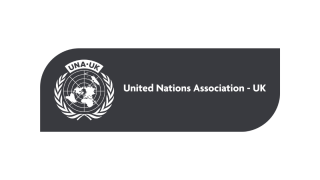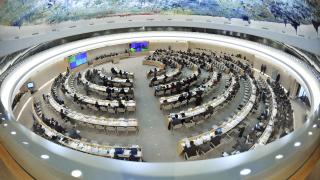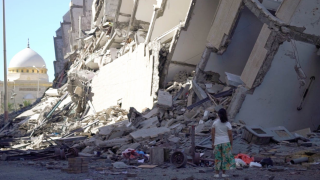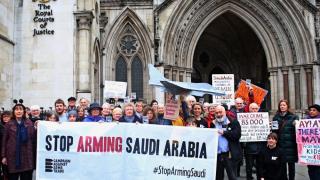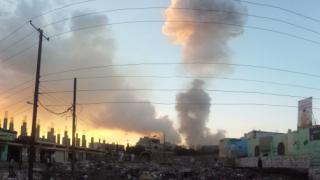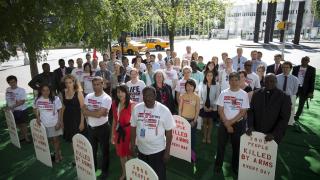
Four weeks of negotiations on an Arms Trade Treaty concluded on 27 July 2012 without agreement on a text. Russia and the United States called for discussions to be postponed, citing lack of time to resolve outstanding issues with the draft. They were joined by North Korea, Cuba and Venezuela, and supported by Syria, Iran, Egypt and Algeria, who had opposed the treaty throughout the negotiations.
UNA-UK is deeply disappointed by this outcome. A strong, legally-binding treaty to regulate the arms trade is a vital step towards a safer world. Over the past 18 months, the use of arms against civilians in the Middle East and North Africa has demonstrated powerfully what happens when these weapons fall into the hands of those willing to commit human rights abuses. It is particularly tragic that Russia, which continues to sell arms to the Syrian government, played a key role in stalling negotiations as the Assad regime geared up for an assault on Aleppo. Some 200,000 people are thought to have fled the violence over the past two days.
But UNA-UK remains confident that a robust treaty is within our reach. At the end of the negotiations, over 90 states issued a statement, read by Mexico, saying they are “determined to secure an Arms Trade Treaty as soon as possible”. UNA-UK hopes that a breakthrough can be achieved at the UN General Assembly this autumn. As Secretary-General Ban Ki-moon noted, there is “considerable common ground” that countries can build on.
UNA-UK will continue to work with its partners in the Control Arms coalition and push for an ambitious, watertight treaty, with renewed focus on weaknesses in the latest draft text. In particular, we will call for the treaty to:
- Include the widest possible range of conventional arms, as well as ammunition and components
- Be firmly based on international human rights and humanitarian law
- Prevent arms transfers – with no exceptions – when there is a high risk that they will be used against civilians and/or to commit human rights abuses
- Cover existing arms deals and arms supplied through military assistance programmes (or similar)
We will also urge the UK to continue to work for the strongest possible Arms Trade Treaty. Since discussions began in earnest in 2006, the UK has played a leading role in championing a robust treaty grounded in human rights. During the negotiations, however, there were signs that the UK might be willing to accept a weaker treaty that has universal buy-in.
Click here to read a letter from UNA-UK Chairman Sir Jeremy Greenstock to FCO Minister Burt
While a treaty with broad participation is, of course, desirable, UNA-UK strongly feels that a robust treaty – even if not all states are willing to sign it in the short term – will prove far more effective in the long run than a weaker treaty that every state can subscribe to and subsequently ignore.
UPDATE: Minister Burt replies to Sir Jeremy Greenstock
In a reply to Sir Jeremy Greenstock's letter, Minister Burt states that the draft text 'is robust and if adopted, would bring about a very significant improvement on the current situation'. UNA-UK does not recognise the draft text as 'robust' and finds it concerning that the UK Government appears ready to sign-up to a watered-down treaty that, if adopted, would be ineffective and could institutionalise an unacceptably low regulatory standard for arms transfers.
UNA-UK still believes that a strengthened text should be taken forward at the General Assembly, a forum that would not necessarily be bound by consensus and as such would not need to cater for the lowest common denominator.

